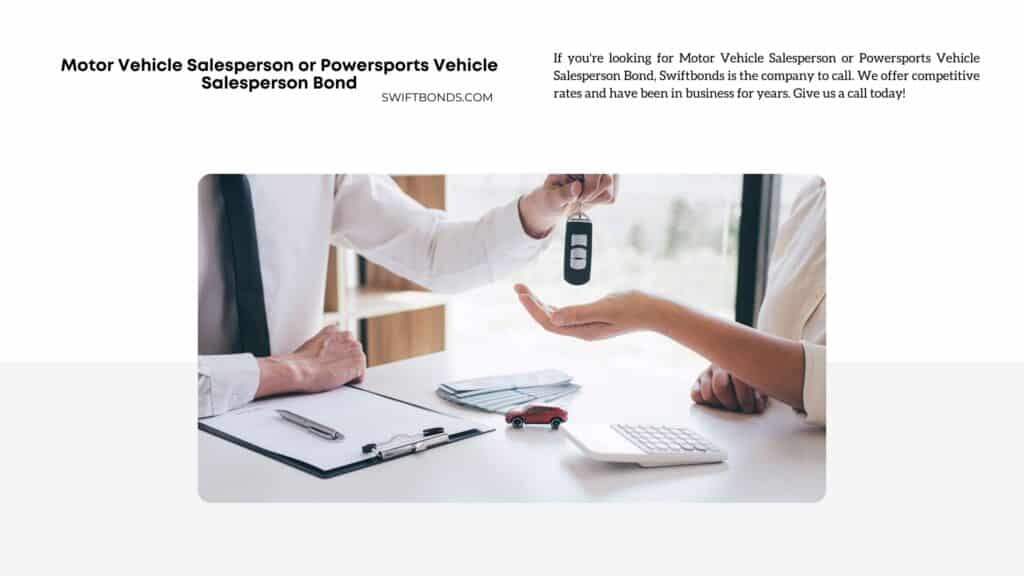The $15,000 Bond
In Colorado, the law requires motor vehicle salespersons or powersports vehicle salespersons to have a $15,000 bond. This bond is a legal requirement to ensure that salespersons operate with integrity and protect consumers from fraud or misconduct.
How Does It Work?
Let's say you're a salesperson and you do something wrong, like selling a vehicle with false information or not following the rules. If a customer suffers financially because of your actions, they can file a claim against your bond. The bond company will investigate the claim, and if it's found to be valid, they will compensate the customer up to the bond amount, which in this case is $15,000.
Who Needs It?
Any individual who sells motor vehicles or powersports vehicles in Colorado needs to get bonded. This includes salespersons working at dealerships, independent salespersons, and even online sellers if they're based in Colorado.
How to Get Bonded
As per our expertise, getting bonded is a straightforward process. You'll need to find a reputable bonding company that operates in Colorado. They'll guide you through the application process, which typically involves filling out some paperwork and paying a premium, which is usually a small percentage of the bond amount.
Maintaining the Bond

Once you're bonded, you need to make sure you follow the rules and regulations governing vehicle sales in Colorado. This includes being honest and transparent with customers, providing accurate information about the vehicles you're selling, and complying with all relevant laws.
What Happens If You Don't Have a Bond?
If you try to sell vehicles in Colorado without a bond, you could get into serious trouble. Not only is it illegal, but you could also face fines, penalties, and even the loss of your salesperson license. Plus, without a bond, you won't have that safety net to protect your customers if something goes wrong.
Conclusion
The $15,000 bond for motor vehicle salespersons or powersports vehicle salespersons in Colorado might seem like a hassle, but it's an important safeguard for both salespersons and customers. It ensures that salespersons operate with honesty and integrity, which ultimately benefits everyone involved in the vehicle buying process. So if you're thinking about getting into vehicle sales in Colorado, make sure you get bonded – it's not just a legal requirement, it's the right thing to do.
Frequently Asked Questions
Can the Bond Protect Salespersons from Unjust Customer Claims?
While the primary purpose of the bond is to protect consumers, salespersons might wonder if it offers any safeguard against false or unjust claims made by customers. The reality is that the bond primarily serves to protect consumers by providing financial recourse if they experience losses due to a salesperson's misconduct. However, if a salesperson believes a claim is fraudulent or unfair, they can challenge it through legal channels and present evidence to support their case. Ultimately, the bond company will investigate the claim impartially before making any decisions.
Are There Alternatives to Obtaining a Bond for Salespersons?
Some salespersons may wonder if there are alternative ways to fulfill the bonding requirement or if there are exemptions available. While bonding is the most common method of compliance, there might be limited circumstances where an alternative arrangement could be made. For instance, certain types of professional liability insurance policies might offer similar protections, although they are not specifically tailored to meet the bonding requirement. However, it's crucial for salespersons to consult with relevant regulatory authorities or legal professionals to explore any potential alternatives thoroughly.
Does the Bond Cover All Types of Vehicle Sales?
Another uncommon question pertains to the scope of coverage provided by the bond. Salespersons might wonder if the bond applies equally to all types of vehicles or if there are specific categories excluded from coverage. Generally, the bond requirement applies to motor vehicles and powersports vehicles as defined by Colorado law. This typically includes cars, trucks, motorcycles, ATVs, snowmobiles, and similar vehicles. However, certain specialized or niche vehicles might fall outside the scope of the bond requirement. Salespersons dealing with such vehicles should seek clarification from regulatory authorities to ensure compliance with bonding regulations.



